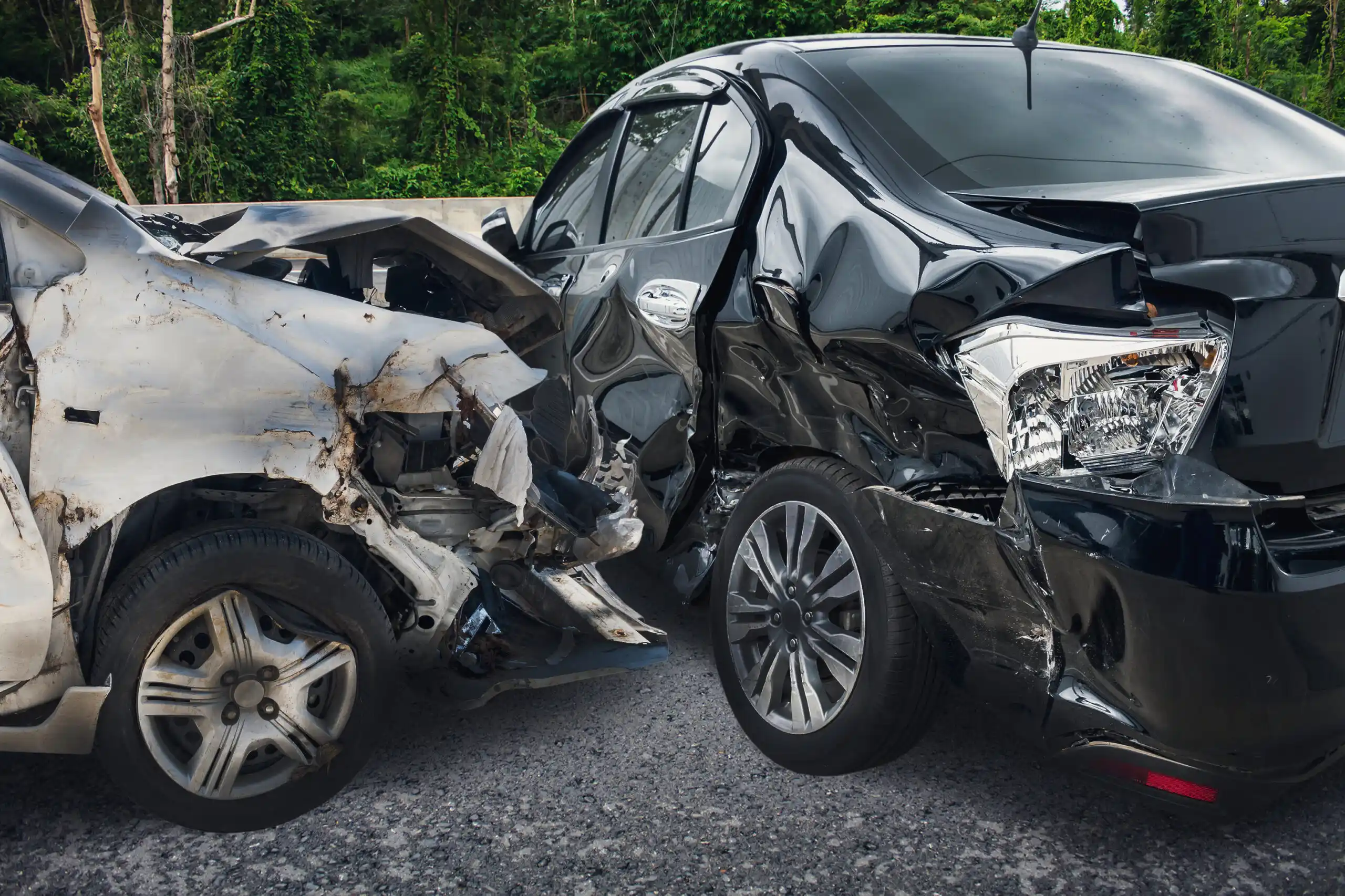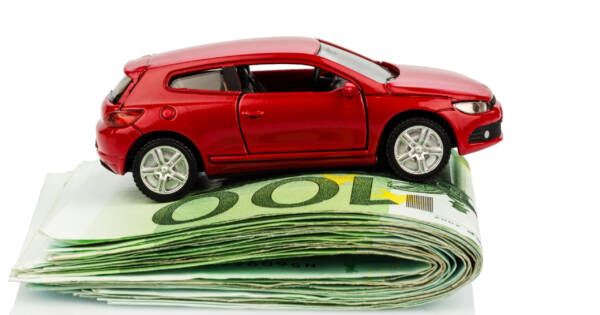I still remember the accident like it was yesterday. We were packing up to go home after graduation. I was following my friend in his own car. Then out of nowhere, he swirled to the left and back onto his lane. Instead of focusing on what he was trying to avoid, my eyes were fixated on the erratic driving of his car. By the time I saw the huge traffic barrier that was now right in front of us, I made a sudden yank of the wheel. I managed to avoided the obstacle. However, I ended up losing control of my car entirely in the process. We skidded sideways across several lanes, hit the side barrier, and then spun around a few times back across the entire six-lane freeway. We finally came to a stop in the ditch on the other side of the road.
It all happened so fast. When I think back, I’m really lucky to be alive. Actually, it was a miracle that no one was even really hurt. In fact, we didn’t even hit another car, despite crossing what must have totaled 10 different lanes, hitting the middle dividers, and careening back across to the other side of the freeway. I had a friend riding shotgun and I remember freaking out when I saw her with her eyes closed. However, it turned out that she was just closing her eyes to calm herself down after a scary ordeal.
RIP Car
My car, however, wasn’t so lucky. We later found out from car insurance that the repair is going to cost more than what the car was worth. In other words, the car was totaled. Repairing vehicles keeps getting more and more expensive, so insurance companies writing them off is a fairly common practice.
At the time, I could hardly afford groceries then, let alone a new car. The amount of money my insurance company offered me (minus my $1,000 deductible) seemed pretty paltry. I know I wasn’t driving a brand new luxury car, but surely my ride was worth more than their offer, right? I started asking more questions.
Learn to Negotiate
However, as I learned through that experience, just because your insurance company makes an offer doesn’t mean you have to just accept it. You can actually negotiate with them. And don’t be afraid to deal with the insurance agent either. Contrary to popular belief, the agent isn’t out to get you by making the lowest offer he possibly can. Their primary motivation is simply to keep their job — which is to help you and the insurance company feel comfortable with the final deal. If you can reasonably argue your case (with solid evidence), you’ll normally find both the agent and insurance company are reasonable. Here are some tips for making sure you get your money’s worth when your insurance company considers your car totaled.
Determine How Much Your Car Was Worth
Your insurance company will be doing the exact same thing. However, their tools will be different from yours. In particular, you should enter all of the specific information about your exact car’s features into Kelley Blue Book, Edmunds, and NADAguides. These will tell you the approximate value of your car. It’s important to note, however, that you should check all three sites.
According to Steven Lang from The Truth About Cars, “Kelley has improved their pricing models… but sometimes underprices older vehicles. Edmunds tends to have the strongest pulse on older vehicles. NADA covers the world of auto financing, and they tend to have the highest valuations of all.”
Find Comparable Cars For Sale
Simply knowing your car’s value according to those guides might not be enough to convince your insurance company. They might need to see hard numbers showing what your car is worth in your particular market.
When I went to meet with my insurance agent, I brought along print outs of about five or six comparable Civics for sale in the Columbus, Ohio area, where I was living at the time. Although none of the half dozen cars for sale were exactly like mine — none had a sun roof or a manual transmission, for example — I was able to make a point. I proved that if I had sold my car on the day before the accident, I would have been able to get anywhere from $1,500 to $2,000 more for it than they were offering me as its value.
Make sure you do your best to compare apples to apples here. Not every 2016 Honda Civic is the same, for example. Your model may have been the base trim with no extra bells and whistles. Maybe it had a few dings and dents, 50,000 miles, and rust was starting to creep in. Don’t bring examples of well-maintained, fully loaded Civics with barely any miles on them to your insurance company. They will laugh you out of the room.
Bring Receipts for any Recent Additions or Upgrades
If you have made any aftermarket additions to your car that add to its value, they can potentially affect the value of your vehicle. It could include anything from new tires to a deluxe stereo system. However, you will need to provide receipts for these additions. Make sure they show both the cost at the time of installation and how recently you added them.
You need to be careful here though. Those aftermarket parts might include customization that is fairly expensive — especially if they are performance related. Your car insurance is probably only covering the original car. Any major changes you make needs to be noted on the policy. Otherwise, your claim may flat out be denied because you have changed the car they were originally insuring against.
You should also know that most aftermarket upgrades won’t really do much to increase the value of your car. You might love that $2,000 stereo and speaker set-up. However, you’d never recover that whole cost when selling your vehicle. The insurance company will see it the same way too.
Remember The Phrase “Make Me Whole”
This is where it’s important to read the fine print of your insurance policy. One common phrase used in insurance policies of many kinds is “make you whole.” The short explanation is that the policy is supposed to cover getting your life back to normal — whether that’s repairing your leaky basement or fixing your car.
If your car insurance is offering you $7,500 for your totaled car, but you wouldn’t be able to buy a comparable model (same year and mileage) for anything less than $10,000, you need to hold out. If you’re willing to put in your own time and effort, you can likely research a better solution.
In some cases, you might be able to show your insurance company an ad for a used car that is almost identical to your totaled ride. You can straight up ask them “buy me this car, it will make me whole.” Or ask them to cut you a check for the amount on the ad, with the promise you will buy the comparable car.
Last Resorts
If your insurance company is playing hard ball, you can match their stubbornness. They want the claim settled too, but are usually willing to hold out. They are counting on your giving in before they do. Don’t let them win. Follow the above advice to politely and confidently argue your case. If that doesn’t work, consider hiring a lawyer.
There are plenty of lawyers who make their who careers taking insurance companies to court. Just make sure that your legal fees don’t completely wipe out any potential gains you would get from shaking the insurance company down for a higher settlement. For example, if you are offered $8,500 for a totaled car that is really worth $10,000, you might find that extra $1,500 quickly swallowed up my legal fees. Negotiate your fees with a lawyer ahead of time, if you can, so you know exactly what fighting for more money will cost you.
The Bottom Line
While it’s in your insurance company’s interest to keep your payout low, they also want to keep your loyalty and their reputation for fairness. So if your car has been totaled, make sure you do your homework before accepting their payout offer.
In my case, coming prepared to the meeting with the insurance agent paid off. They quickly increased their initial offer by $1,250. It was less than I’d hoped for, but much more than I would have gotten without research and tenacity.
 Shutterstock
Shutterstock


